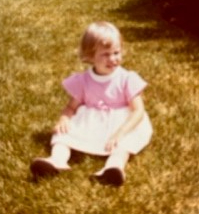Last night I had a disagreement with my husband and knew at the time I was not articulating myself well, so I headed to bed. I woke up around 5 AM feeling unsettled and picked up my book, hoping it would lull me back to sleep.
“With the ease of someone completely adored.” That line jumped out from the page. This – this is the very thing I was doing a terrible job of trying to explain last night, my words getting jumbled with emotion and frustration that he didn’t understand me.
As an adoptee, my baseline at birth is very different from people whose birth parents keep them. Research is uncovering how the preverbal trauma adoptees experience impacts them throughout their lives. This is not to say that we sit feeling sorry for ourselves. No, that is not the case. Many stay “in the fog” a term used by adoptees who have not yet confronted their adoption trauma. I was that person for decades, exclaiming, “I’m fine! I’m lucky! It’s all great,” while feeling so uncomfortable inside but not understanding that discomfort was not experienced by the world at large.
If you are an adoptee, you’ll identify with this immediately. If you’re not, please stay with me because it is important that you understand if you have an adoptee in your life.
At birth, most non-adoptees live from equilibrium, safety, connection, security and love. There are cases where this isn’t true – if a birth mother dies or the child is separated from the parents, but for the most part, there is this sense of ease. I see this baseline of safety in my own children – even in their hardest moments, and they’ve had many because they have a genetic bone disorder, they have the absolute knowledge that they are loved, adored, and safe with us. I see it in my brother – the biological child of my adoptive parents, my husband and his siblings. I’ll think “how entitled,” when they act in a certain manner, and they are, to no fault of their own. They don’t know how lucky they are and how much harder it is for me to feel safe and secure.
An adoptee begins life from a place of fear, the unknown, alone, loss, confusion. After 9 months of being literally dependent on another being, we are born and torn away from this being. She is not there. No familiar sounds or heartbeats. No recognizable smells or the person we desperately need to feed us, hold us or comfort us. Adoption now allows adoptive parents to be with the child at or immediately after birth, and while this allows the new family to bond, it does not take away the trauma the baby experiences. Yes, someone is with them attending to their cries, but not the person they are seeking. This is not to say that the baby does not form attachments to their adoptive parents, it’s just that adoptees start from a place of loss – our baseline is from a place of disequilibrium, and we must work harder to get to that place of security and equilibrium.
There is plenty of trauma-based research out helping adoptees understand and heal. I’ve spent the better part of five years working through my adoption trauma and still get triggered.
Back to our disagreement. I created a quick medical consent form, while preparing for a quick out of town getaway. Overkill? I hope so. For me, the “just in case” aspect of the form gives me comfort. It has my children’s insurance information, their allergies and consent for my sister-in-law to make decisions in case we are not available. My husband asked why I was all “doom and gloom” which sent me into a tailspin. Don’t get me wrong, he’s been incredibly understanding and patient as I’ve worked to unravel a lifetime of denial. I felt myself sputtering to explain and getting angry, so I put myself to bed. I didn’t want to say something I’d regret because I was triggered by our disagreement and couldn’t explain myself clearly.
I’m jealous and in awe of the ease with which he moves through the world with a confidence that no matter what, he is not only meant to be here, but is very cherished. I’m proud of myself for stepping away from a petty argument and instead waiting to explain my actions from a grounded place.
Before you say, “but you are cherished, your parents love you,” please stop. The love I have experienced in my life does not erase the infant trauma of being separated from my birth mother. The baby inside of me was alone. My first weeks in life I was scared and searching. This fear lives inside me and all adoptees. We can heal from it, but it is always there and sometimes it is triggered.
I hate that I must explain myself, but I’m grateful for the work I’ve done to heal. If I look back on the fights we’ve had over our 18 years of marriage, I can now see where my preverbal trauma was running the show and I’m even more proud of myself for recognizing it last night and heading to bed. My husband may not need a “Consent to treat” form, but if it makes me feel at ease, then this is what we’ll do until I don’t need to do it anymore.

